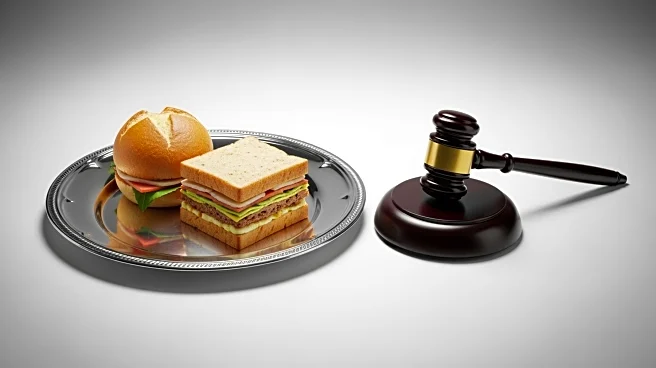What's Happening?
A federal jury in Washington, D.C., has acquitted Sean Dunn, a former Department of Justice paralegal, of misdemeanor assault charges after he threw a Subway sandwich at a federal agent. The incident occurred
in August during a federal law enforcement deployment in the nation's capital, ordered by President Trump in response to alleged rampant crime. Dunn was charged after allegedly shouting expletives at Customs and Border Protection Officer Greg Lairmore and throwing the sandwich at him. The jury's decision came after several hours of deliberation, marking a setback for the U.S. Attorney for D.C., Jeanine Pirro, whose office had previously failed to secure a felony indictment against Dunn.
Why It's Important?
The acquittal highlights tensions surrounding President Trump's federal policing measures in Washington, D.C., which have been met with resistance from local residents. Dunn's case has become emblematic of opposition to the administration's law enforcement tactics, which critics argue are heavy-handed and infringe on civil liberties. The decision may influence future cases involving federal officers and local protests, potentially affecting how such incidents are prosecuted. It also underscores the challenges faced by federal authorities in securing convictions in politically charged environments.
What's Next?
The acquittal may prompt further scrutiny of the federal law enforcement presence in Washington, D.C., and could lead to calls for policy changes. Legal experts and civil rights advocates may use the case to argue for more restrained approaches to policing protests and dissent. Additionally, Dunn's acquittal might embolden other individuals facing similar charges to contest them in court, potentially leading to more high-profile trials and legal challenges.
Beyond the Headlines
The case raises questions about the balance between maintaining public order and respecting individual rights during protests. It also highlights the role of humor and public perception in legal proceedings, as evidenced by the courtroom reactions to the sandwich incident. The broader implications for civil liberties and the right to protest in the U.S. may be significant, as the case could set a precedent for how non-violent acts of protest are treated legally.









